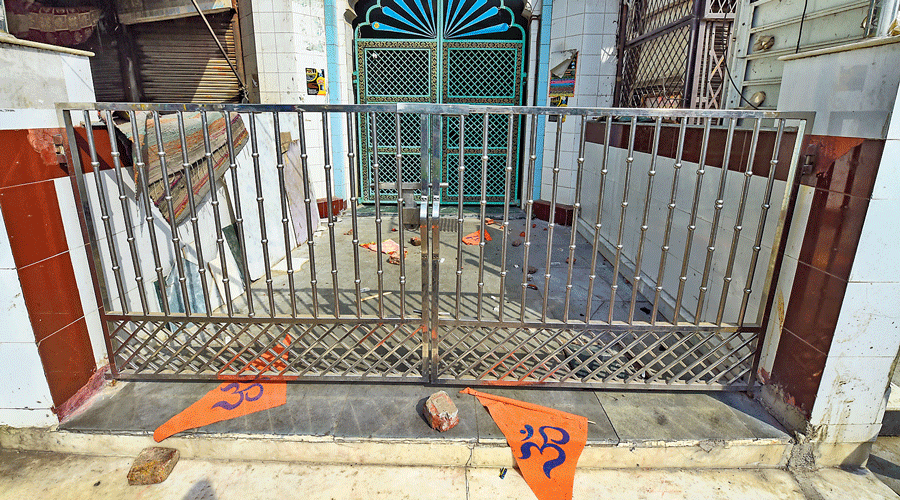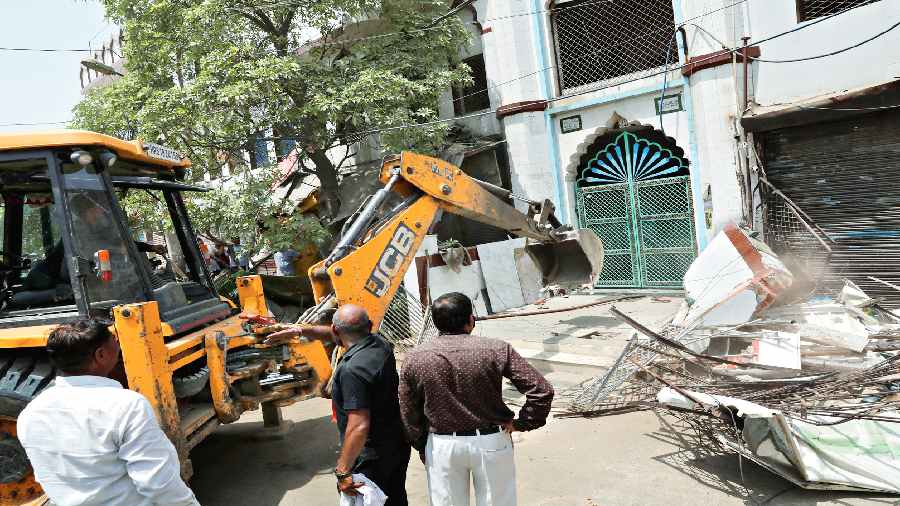A local court has castigated Delhi police for failing to stop the unauthorised Hanuman Jayanti procession that allegedly provoked a communal clash in the Jahangirpuri locality, saying cops had “accompanied the illegal procession” and “their complicity, if any, needs to be investigated”.
Nine people including eight policemen were injured in stone-throwing and firing during the April 16 violence, which occurred after some processionists allegedly chanted abusive slogans, entered a mosque during namaz and tried to plant a saffron flag inside.
Several videos, purportedly of the procession, show men brandishing guns and swords and carrying saffron flags. Delhi police, who report to the Union home ministry, have been accused of standing by and watching.
“It prima facie reflects the utter failure on the part of local police in stopping the said procession having no permission. The issue seems to have been simply brushed aside by the senior officers,” additional sessions judge Gagandeep Singh of the Rohini Court said in Saturday’s order, which was uploaded on Sunday.
“The liability on the part of the concerned officials needs to be fixed so that in future no such incident takes place and the police is not complacent in preventing illegal activities. Their complicity, if any, also needs to be investigated.”
The judge directed that a copy of the order be sent to the Delhi police commissioner “for information and remedial compliance”.
Several retired intelligence and police officers had earlier told The Telegraph that the police seemed to have played a “dubious” role in Jahangirpuri.
After the February 2020 Delhi riots, too, the Delhi
minorities commission had accused the police of being “complicit and abetting the attacks” and later tending to arrest the victims rather than those they had accused.
Saturday’s court order said: “It is fairly admitted on behalf of the State that the last procession which was passing through, during which the unfortunate riots took place, was illegal having no prior permission from police.”
It said the FIR showed that “the local staff of Jahangirpuri police station, led by inspector Rajiv Ranjan, as well as other officials from DCP reserve were accompanying the said illegal procession on its route instead of stopping it”.
“It appears that local police, instead of performing their duty in stopping the said illegal procession in the beginning itself and dispersing the crowd, was accompanying them to the entire route which later on led to unfortunate riots between the two communities,” the order said.
The court issued the order while dismissing the bail applications of eight accused — Noor Alam, Imteyaz, Ahmad Ali, Sahahada, Zakir, Ahir and two men named Sheikh Hamid — who had argued they were not present at the site of violence and had been falsely implicated.
The court cited the prosecution’s argument that the accused were “known criminals” and, if freed, might threaten and influence witnesses. “The chargesheet is yet to be filed. The allegations are serious,” the court added, denying bail.
Muslim residents of Jahangirpuri have alleged a “one-sided” police investigation, accusing the force of portraying the minorities as “aggressors” and treating the armed provocateurs from the procession with kid gloves.
An officer said more than 30 people had been arrested, most of them Muslim. The stringent National Security Act has been invoked against five arrested — all Muslim.
The NSA allows preventive detention for up to a year, even without specific charges, and is often invoked to keep behind bars accused who have received bail in a related case.
Both Hindu and Muslim residents had told this newspaper the Jahangirpuri clash was provoked by “outsiders” among the processionists.
The FIR lodged by inspector Rajiv Ranjan on his own at Jahangirpuri police station does not mention any provocation. It says the violence broke out around 6pm after a man named Ansar and his associates (those now detained under the NSA) began arguing with the processionists.
The FIR invokes the charges of attempt to murder, criminal conspiracy, rioting and other provisions of criminal law and the Arms Act.
“So far, the Delhi police have not made public how many members of the illegal procession, who were carrying swords and pistols, have been arrested. They are only busy framing Muslims,” a Jahangirpuri resident said, requesting anonymity.
He said the courts were Indian Muslims’ only hope, adding: “We welcome the ruling of the Rohini Court judge.”
A fact-finding delegation of three Left parties has concluded that the clash was the fallout of a Sangh parivar agenda to use religious festivals to foment communal strife, as seen in some states during Ram Navami last month.
On April 18, CPM politburo member Brinda Karat wrote to Delhi police commissioner Rakesh Asthana urging action against officers who had allowed the processionists to carry weapons, failed to arrange adequate security, let the procession stop before the mosque, and were conducting a biased investigation.
Asthana has underscored that people from “both communities” have been arrested. He has denied any attempt by the processionists to plant a saffron flag at the mosque.
The police had earned more condemnation on April 18 by appearing to buckle under a Vishwa Hindu Parishad threat of “a battle” if any action was taken against its activists in connection with the Jahangirpuri violence.
The police had initially registered an FIR against the organisers (VHP and the Bajrang Dal) for holding the procession without permission and arrested Prem Sharma, a local VHP leader.
After the VHP threat, the police said that penal section 188 (disobedience to order duly promulgated by public servant) was a bailable offence and that Sharma had joined the investigation and been allowed to leave after questioning.











